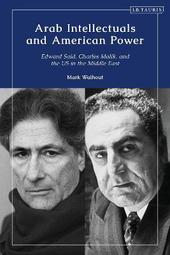
|
Arab Intellectuals and American Power: Edward Said, Charles Malik, and the US in the Middle East
Paperback / softback
Main Details
| Title |
Arab Intellectuals and American Power: Edward Said, Charles Malik, and the US in the Middle East
|
| Authors and Contributors |
By (author) M.D. Walhout
|
| Physical Properties |
| Format:Paperback / softback | | Pages:304 | | Dimensions(mm): Height 234,Width 156 |
|
| Category/Genre | National liberation, independence and post-colonialism |
|---|
| ISBN/Barcode |
9780755639229
|
| Classifications | Dewey:305.5520922 |
|---|
| Audience | | Tertiary Education (US: College) | |
|---|
|
Publishing Details |
| Publisher |
Bloomsbury Publishing PLC
|
| Imprint |
I.B. Tauris
|
| Publication Date |
21 April 2022 |
| Publication Country |
United Kingdom
|
Description
Edward Said, the famous Palestinian American scholar and activist, was one of the twentieth century's most iconic public intellectuals, whose pioneering and - to some - controversial work on Orientalism shaped Middle Eastern and postcolonial studies and beyond. But how exactly did he arrive at his famous maxim to 'speak truth to power'? This dual biographical study examines the lives of Edward Said and the eminent Lebanese philosopher and diplomat Charles Malik, a distant relative 30 years his senior whom Said knew from childhood as "Uncle Charles." To Said, Malik was no ordinary relative; in his memoir, he called Malik "the great negative intellectual lesson of my life", and was to describe him as "an ideal as I was growing up" only to later claim Malik "went through an ugly transformation that I could never come to terms with". M.D. Walhout charts the development of these two remarkable figures, reconstructing in the process the way in which American power in the Middle East came to have a defining effect on Arab intellectuals in the twentieth century. Exploring issues of religion and nationalism, Walhout shows how Said came to reject much of what Malik stood for: Christian faith, hardline anti-Communism and the benign nature of American power. He argues that the example of Malik was instrumental in the development of Said's later belief that the true vocation of the intellectual was not to compromise with power, but to resist it.
Author Biography
M. D. Walhout has been Professor of English at Seattle Pacific University, USA since 1987. He earned his Ph.D. in English from Northwestern University, USA in 1985. His previous work on Edward Said includes an article on Said and Michael Walzer in Soundings, republished in Patrick Williams' fourvolume collection on Edward Said for the SAGE Masters in Modern Social Thought series (2001), as well as a chapter on Said and Salman Rushdie in Literature and the Public Sphere, edited by Susan VanZanten Gallagher and M. D. Walhout (2000).
|